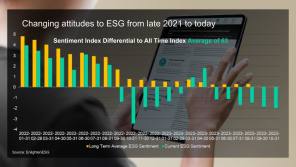

The government has called for a greater emphasis on the social element of pension schemes' environmental, social and governance strategies, as there is a concern that trustees are ill-equipped to deal with these factors.
In a call for evidence published yesterday (March 24) by the Department for Work and Pensions, Guy Opperman, minister for pensions and financial inclusion, said the industry had a good understanding of good governance, however he was concerned that “social factors are not well understood”.
He said trustees need to have policies on engagement and views on ethical and quality of life issues.
“Many pension scheme trustees’ policies in relation to social factors are high level and unilluminating.
“There is a concern that trustees are ill-equipped to deal with financially material social factors in their investments,” Opperman warned.
The call for evidence aims to address what is happening around factors such as supply chains, how exposed trustees are to the risks posed by action on these issues, and what they are doing in response, amongst other areas.
Clar Christie, responsible investment officer at Dalriada Trustees, said: “Ethics is very subjective, and therefore a lot of trustees are hesitant to take this into account. However, it can be difficult to separate this completely from ESG investment issues.
“There is plenty of evidence of financial consequences for companies who face backlash from consumers on the basis of ethics, particularly social issues like equality.”
Statements lack social factor policies
The document also showed that DWP conducted a high-level review of statements of investment principles for 25 large DB schemes and 15 large defined contribution master trusts, which showed that most statements already have a dedicated ESG section.
However, the majority of those documents reviewed did not differentiate between the separate ESG factors, with a lack of policies addressing social factors.
The document read: “Most SIPs used boiler-plate wording around delegating investment management responsibility to asset managers, with brief assurances that the asset manager’s policies are consistent with the trustees’ ESG beliefs.
“A minority of SIPs expanded on the social factors and selected specific areas to focus on. Common themes included gender diversity, labour standards and controversial weapons. The rationale for choosing to focus on specific social factors was limited.”
Opperman noted that climate change was the most urgent risk facing the society and economy and there was a need to act now, but “climate change itself is only one part of the ‘E’ of ‘ESG’,” he added.
“It has never been my intention that climate change should be trustees’ sole ESG consideration - not least because action on climate change is often linked to action on wider social factors.”
The call for evidence also addressed how trustees can consider social factors such as screening, tilted funds, social impact investing, voting in a way that supports social considerations, and engagement either directly or through an asset manager.
Implementation considerations for these factors included the level of financial risk-mitigation, cost, delivery method, governance and scheme type, the document stated.
Tom Selby, senior analyst at AJ Bell, said: “Today’s call for evidence is a clear attempt by the DWP to shift that narrative by probing the extent to which trustees are asking the right questions about the social impact of members’ investments.
“While social factors are both wide-ranging and may mean different things to different people, the government is clear issues ranging from modern slavery to community engagement and public health need to be considered.”
Alistair McQueen, head of savings and retirement at Aviva pointed out that the government “recognises that the potential for good goes beyond the environment, towards social and governance considerations.
“The timing is positive as it aligns with the expansion of independent governance committee remits to include all elements of ESG investing from 2021.”
Ruth Gillbe is a reporter at FTAdviser's sister publication Pensions Expert



